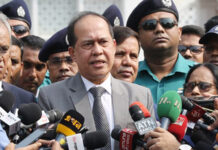Jamaat-e-Islami Secretary General Ali Ahsan Mohammad Mujaheed is being taken to International Crimes Tribunal from Dhaka Central Jail
The country’s second war crimes tribunal on Wednesday awarded a death sentence to Mujaheed for mass murders the 66-year-old planned and executed during the 1971 Liberation War.
The presiding ICT-2 judge – Justice Obaidul Hassan – described Mujaheed as an “atrocious Al-Badr” commander who conspired, abducted, tortured and murdered.
He started speaking at 11:05am, giving the background to the verdict in a crowded courtroom.
Later, Justice Mozibur Rahman Miah and Judge Shahinur Islam read out the 37-page executive summary of the 209-page verdict in presence of Mujaheed.
The top defence lawyer said they would appeal because the tribunal failed to assess the evidence properly.
Of the seven charges brought against the Jamaat Secretary General, the tribunal found the former Al-Badr commander guilty of five.
Mujaheed was found “guilty of extermination of intellectuals” and involvement in the murder and torture of Hindus, for which he was given death sentence.
He got death for the first charge – abduction and murder of journalist Sirajuddin Hossain.
The first charge was “merged” with the sixth charge — conspiracy and extermination of intellectuals; the death penalty came for these two.

The tribunal said Mujaheed would go to the gallows for the seventh charge – murder and torture of Hindus – proven beyond any reasonable doubt.
He got life sentence for his role in the abduction torture and murder (charge 5) of composer Altaf Mahmud, well-known freedom fighters Shafi Imam Rumi, Badiuzzaman, Magfar Ahmed Chowdhury Azad, Abdul Halim Chowdhury Jewel and Jahir Uddin Jalal (who managed to flee).
Charges of genocide (charge 2) and abduction and torture in another instance (charge 4) were not proven beyond reasonable doubt.
For the third charge – another abduction and torture – he was given five years in jail.
“All the sentences will naturally merge into a single sentence of death,” the judge said.
“This is a gross injustice,” Mujaheed said standing up in the dock after the verdict.
“It has been given because of my Islamic movement,” said the man who once denied the existence of war criminals in Bangladesh and said there were no anti-independence elements either.
As policemen were taking him away, Mujaheed said, “The Islamic movement will continue.”
The prosecutors got what they wanted.
“The mass murder of our intellectuals was an unforgettable element of our Liberation War. This verdict of death sentence for Ali Ahsan Mohammad Mujaheed has finally provided justice for those mass murders,” said MK Rahman, prosecution coordinator and Additional Attorney General.
“The pain in our heart for the loss of great souls like journalist Sirajuddin or martyr Rumi has been there for long despite us getting independence,” Rahman said. “Finally we can breathe easy.”
Freedom fighters waiting outside the tribunal greeted the news with cheers. “We’ll be happy only when the hanging is carried out,” said freedom fighter Jahir Uddin Jalal, better known as Bicchu Jalal.
“We are satisfied,” said Shaheen Reza Nur, son of Sirajuddin, Executive Editor of then top Bangla newspaper Ittefaq.
The defence lawyers, however, echoed their statements they had made on previous occasions.
“With due respect to the tribunal, this is a wrong verdict,” said chief defence counsel Abdur Razzaq. “They have failed to evaluate the customary law in this regard.”
“They have failed to evaluate the evidence. We will naturally appeal against this judgment.”
But all three judges of the tribunal were convinced and unanimous.
“The charges have been proved beyond doubt,” Justice Obaidul Hassan, the chief of the panel, said in a courtroom crowded with journalists, lawyers, observers and families of the victims of 1971 war crimes and the accused.
The court found Mujaheed, in his mid-20s in 1971, guilty of five charges that included murder of intellectuals, genocide, abduction, torture and arson.
Mujaheed took over as head of the notorious Al-Badr militia in Oct 1971 from the founding chief Motiur Rahman Nizami, who is also being tried on similar charges. The two served as Cabinet ministers in the 2001-6 BNP-led coalition government.
It has been barely seven years that Mujaheed left his job as Bangladesh’s Minister for Social Welfare, when he flew the national flag on the bonnet of his car.
The Wednesday’s judgment establishes, legally at last, that he abducted, tortured and killed those who fought for that flag.
His party called a daylong general strike to protest the announcement of the verdict.
Another dawn-to-dusk strike was announced for Thursday to protest the judgment, making it four strike calls in as many days, largely ignored by the public.
The verdict came after the court sifted through the testimonies of 18 witnesses and months of arguments. The hearing ended on June 5.
The judgment came hot on the heels of a ‘life in prison’ sentence for Jamaat ideologue Ghulam Azam by another tribunal.
Ruling Awami League expressed ‘satisfaction’ over the death sentence.
“The verdict is appropriate,” CPB President Mujahidul Islam Selim said. “It reflects the people’s expectations.”
Workers Party chief Rashed Khan Menon also echoed Selim.

In Faridpur, Mujaheed’s home district, people were generally ‘happy’ with the verdict but his supporters said justice had not been served, according to the bdnews24.com Correspondent there.
At Shahbagh, the Ganajagaran Mancha faithful, demanding maximum penalty for convicted war criminals, shouted their hearts out.
“We got the verdict that we’ve been waiting for 42 years,” screamed the Mancha spokesman Imran H Sarkar.
He said they would be on the streets until Ghulam Azam was given maximum penalty.
But a grim mood settled over Jamaat adherents who fought pitched battles with police protesting against the sentence.
Reports of violent reaction by the party and its student front came in from different parts of the country.
Over the past several months, Jamaat, the party accused of committing war crimes itself, has unleashed violent street mob to sabotage the trial of their leaders particularly in their strongholds and deadly violence has left over 100 people dead.
Over a year
Mujaheed was indicted on June 21, last year for allegedly committing crimes against humanity including murder, genocide, arson and loot.
The contrasting reaction to the verdict, in the heavily-guarded courthouse and across Bangladesh, is a testament to the bitter divisions sown by the anti-liberation elements that thrived after independence architect Sheikh Mujibur Rahman was killed and the secular Constitution trampled in 1975.
Thirty-five years later, on June 29, 2010, Mujaheed was arrested on charges of defying court orders and was shown arrested in the war crimes case on Aug 2, 2010.
Later, charges against him were taken into cognisance by the ICT-1 on Jan 26 before the case was transferred to ICT-2 set up to judge brutalities during the nine-month struggle for independence.
His formal trial began on July 19, 2012.
The prosecution began its closing arguments on May 7 and concluded it primarily on May 16 and the defence began its closing arguments on May 22 and concluded on June 4.
The International Crimes Tribunals have delivered five verdicts in the past – all of whom were Jamaat leaders or top activists. Previous verdicts observed Jamaat-e-Islami was involved in the war crimes as an organisation as well.
In its first, absconding Abul Kalam Azad, aka Bachchu Razakar, a former Jamaat member, was sentenced to death.
Then, Assistant Secretary General Abdul Quader Molla was awarded life imprisonment. The third verdict ended in death penalty for Jamaat number two Delwar Hossain Sayedee.
The fourth also pronounced death by hanging for Assistant Secretary General Mohammad Kamaruzzaman on May 9. Ghulam Azam’s was the most significant in that he attempted to shove Bangladesh back into Pakistan after the war.

Sworn enemy to minister
Born on Jan 2, 1948 at Khabaspur in Faridpur, Mujaheed joined Jamaat-e-Islami’s erstwhile student organisation Islami Chhatra Shangha while pursuing higher secondary studies at Government Rajendra College in Faridpur. He became the organisation’s President in the district in 1968.
According to prosecution, Mujaheed was made the Dhaka district President of Chhatra Sangha in January 1971. He became the organisation’s ‘East Pakistan’ unit Secretary and soon its provincial President after the war broke out.
Mujaheed became the President of Al-Badr, a force comprised of ICS activists, in October in 1971 succeeding Matiur Rahman Nizami.
Al-Badr carried out missions like mass murder, genocide, kidnapping and looting under his leadership across the country, including in his home district Faridpur and the capital Dhaka.
He refused to surrender with his force even after Pakistan military laid down their arms on Dec 16, 1971.
Mujaheed joined Jamaat-e-Islami after the War and became a member of its central council in 1982. Before rising to the position of Secretary General in 2000, he served as Assistant Secretary General for two years from 1989.
Having never won a parliamentary election, he was put at the helm of the Ministry of Social Welfare by Khaleda Zia in 1991.
He also heads the board of directors of party mouthpiece Daily Sangram. In 2010, Mujaheed claimed Jamaat’s opposition to independence was a political decision and that its leaders were never part of crimes against humanity.
For many, including the son of the slain journalist Sirajuddin Hossain, the judgment gave them an occasion to reflect.
“The verdict served justice for the intellectuals and freedom fighters killed at the hands of Mujaheed,” Shahin Nur told bdnews24.com. “It is also a slap on the faces of the propagandists like Mujaheed who claimed nothing had happened during 1971.”
But Mujaheed’s son Ali Ahsan Mabrur was clearly upset, alleging the verdict was a “travesty of justice based on impressions and not on evidence”.
Source: Bd news24










